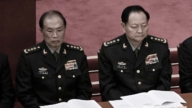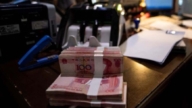【新唐人2012年2月7日訊】中國大陸繼網絡實名制後中共為鉗制言論,又將進行新一輪的網絡監管,日前中共宣傳部門下令,將在大陸各微博成立黨組織,直接監管微博,包括新浪、騰訊、搜狐、網易等設有微博的網站都接到相關指令。分析指出,在虛擬的網絡成立黨組織,等於螳臂擋車既荒唐又可笑。
中共喉舌《新華網》報導,中共十七屆六中全會「決定」強調,加強互聯網管理體系,壯大執法隊伍,可管可控。對可能引發群體性事件的所謂有害信息進行預警、處置、並且實行舉報獎勵制度等。
台灣《聯合報》報導,新年後,大陸各大微博都接到成立黨組織的相關規定。消息聲稱,未來黨組織將負責各大微博的政策引導和決策,在政策、措施上,執行中宣部和國務院及省市網絡管理辦公室的命令。
原陝西電視臺記者馬曉明指出,中共微博建立黨組織的目地,是為加強統治的措施。
原陝西電視臺記者馬曉明:「目前要建立黨組織無非是共產黨加強它對人民的控制,加強統治的一個措施,對人民進行信息交流的一種監控。」
「權力運動」負責人胡軍指出,網絡本身就是個虛擬的東西,在微博成立黨組織太荒唐。
胡軍:「微博裡面他這個年齡層次非常大,它本身就是個虛擬的東西,大家一塊聊兒天,溝通呀,你說你把黨組織建到那裏面的話,你是領導黨的還是領導幼兒園小朋友?還是領導6,70歲的老太太?上網肯定有小娃娃10來歲的,7,8歲的5,6歲的娃娃都上網,也申請,也在微博上寫東西,如果給他們成立個黨支部?你說我怎麼說這個事情,你說這個事要多荒唐就有多荒唐。」
《聯合報》引述權威人士的話透露,這次微博不僅要審查上傳的消息內容,刪除所謂「不良訊息」及「敏感訊息」外,未來網絡公安部門會對微博後臺進行直接管理,並與微博系統對接,一旦面臨社會重大事件,除了設立「字符串」大量刪帖外,還要直接斷網。
去年中國「茉莉花集會」,中共就曾斷網、封號、拘人﹔新疆在「七五事件」後也曾被封網一年多﹔今年新年藏區發生幾起自焚事件後,藏民也被短暫斷網。
胡軍:「現在的通訊工具發展到這種程度以後,這個社會的發展趨勢,也需要這個社會去實現自由的交流,它所做的這種事情,螳臂擋車的事情既荒唐又可笑,這想逆歷史潮流而動的話只有自尋滅亡」
日前世界最大的社交網站之一「推特」為進入中國市場表示會做必要「讓步」。
另外,「臉書」﹙Facebook﹚在向美國證券管理委員會(SEC)提交的首度公開募股(IPO)文件中,曾9次提到中國,認為,中國是「臉書」的巨大潛在市場,將繼續評估進入中國的可能性。
中國問題研究學者程曉農指出,中共目前正在加強比當時谷歌(Google)退出中國時更嚴厲的互聯網政策,現在連微博都加以實名化,這種情況下如果說臉書不是糊塗,那就是說它準備跪下。
新唐人記者李韻、孫寧採訪報導。
CCP to Control Microblogs via New Units
After using real-name system for internet in mainland China,
Chinese Communist Party (CCP) will carry out a new round of network monitoring.
Recently, CCP’ Propaganda Department ordered to establish
units for CCP’ direct supervision within microblogs in China.
Microblogs’ sites like Sina, Tencent, Sohu and Netease,
have received instructions on the issue.
Analysts pointed out that the establishment of CCP units
within the virtual network is both absurd and ridiculous.
CCP’ mouthpiece, Xinhua, reported that the decision
was made at the Sixth Plenary Session of CCP 17th Congress.
It stressed on strengthen the internet management system,
expanding the law enforcement teams, making it manageable and controllable.
As to so-called harmful information which may lead to mass
incidents, an early warning, disposal and implementation of reward systems will be carried out.
Taiwan’s United Daily News reported, after the New Year,
the major microblogs’ websites in mainland China have received provisions for establishing CCP units.
Some messages claim, these CCP units will be responsible
for policy guidance and decision-making of major microblogs.
The orders from CCP’ Propaganda Department will be carried
out via the State Council, provincial and municipal offices.
Former Shaanxi TV station reporter Ma Xiaoming pointed out
that the purpose of CCP establishing these units in microblogs is to strengthen its ruling measures.
Ma Xiaoming: “At present, for CCP to create these units
is to strengthen its control.
And it is a measure of strengthening its ruling,
a kind of monitoring people’s information exchange."
Hu Jun, overseeing the “Power Movement," pointed out
that the network itself is a virtual entity.
To set up party units within the microblogs’ system
is a ridiculous step.
Hu Jun: “In microblogs, the age levels vary significantly.
This is a virtual thing in and of itself.
People come to talk there and communicate.
You say you will build party units within them.
Are you leading the party or kindergarten children?
Or leading the old women of 60 or 70 years of age?
Even small girls use the internet, around 10 years old,
or 7 to 8 years, or 5 to 6 years old,
they are all using internet, and also apply for QQ,
and write in microblogs.
If these party units are for them,… how should I put it…
how absurd this thing sounds?"
The United Daily News quoted authoritative sources
about the details of this CCP new control over microblogs.
It revealed that besides monitoring the uploaded messages,
and deleting the “bad messages" and “sensitive information,"
the new CCP units will directly manage the microblogs’
background and will connect to their systems.
In cases of major social events, besides establishing “strings"
for deleting a large number of posts at once, CCP will also be able to directly cut off the entire network.
Last year during China’s “Jasmine rally,” CCP had broken
into the internet and into user accounts, thus arresting people.
In Xinjiang, after the July 5th Event, the internet had also
been blocked for over a year.
During the New Year recently, after several self-immolations
happening in Tibet, Tibetans internet was briefly blocked too.
Hu Jun: “At present, the communication tools have developed
to such a degree,
the development trends of the society also need the society
to realize about the free exchanges.
What CCP has done is like mantis trying to stop the cars.
It’s both absurd and ridiculous.
It wants to reverse the trend of history,
and this just sounds suicidal.”
Recently, one of the world’s largest social networking sites,
Twitter, expressed a wish to enter the Chinese market.
It said that it is prepared to make
the necessary concessions.
Facebook on another hand, had mentioned China nine times
in a document to the US Securities and Exchange Commission (SEC) in relation to its Initial Public Offering (IPO).
It believes that China is a huge potential market for Facebook,
and it will continue to assess the possibility of entering China.
Cheng Xiaonong, scholar of China issues, pointed out, CCP
is now strengthening even more its internet policies than the time when Google withdrew from China.
Now even microblogs are under the real name system’ policy.
This makes people wonder whether Facebook is confused,
or ready to get on its knees.
NTD reporters Li Yun and Sun Ning






























